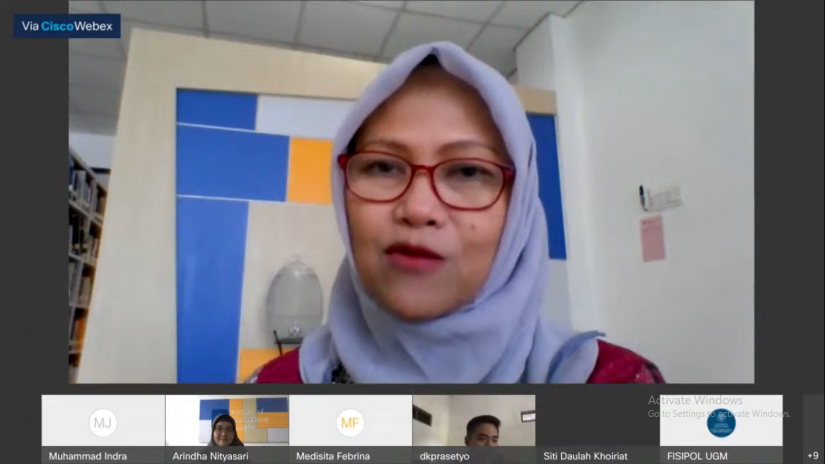
Yogyakarta, July 27th 2020—The Community Service (PkM) Fisipol UGM team collaborated with UGM’s Institute of International Studies and UGM’s Center for World Trade studies in holding the second discussion series. After talking about the economy of the pesantren community, this discussion raised a topic about women household business empowerment in the midst of the pandemic through digitalization. Held through Webex, this discussion series had three speakers from the PkM Covid-19 team. Those speakers are Arindha Nityasari and Muhammad Indrawan who are researchers from IIS UGM, and Dita karisma Prasetyo from CWT UGM.
There was also Siti Daulah, an International Relation professor in UGM who is also the Head of the PkM team. The community service theme was ‘Strengthening women’s small business to face the Covid-19 pandemic effect through social media based online marketplace’. Daulah said that this project was a response to the society’s problem in the midst of the pandemic. “We tried to find partners that can be a target as well as a source of capital for the next programs,” Daulah explained. Finally, PkM partnered with Mitra Insani Union. Daulah then explained the result of her research on the society’s condition. On the one hand, she saw that women are significantly impacted by this pandemic. On the other hand, women also have a better resilience in facing the pandemic. “Women who are in the lowest part of the society are those who we partner up with,” Daulah elaborated.
Arindhita Nityasari, or commonly referred to as Arin, also gave an explanation about the research result. The first result is that the physical distancing policy has harmed many vulnerable groups. The second result is women are one of the part of the vulnerable groups already mentioned. Third, to give a solution to the problem, the PkM team offered an innovation and creation for the Women owned small businesses. “The government have already spent a lot of money to give aids, however it’s merely a survival kit,” Arin elaborated further. Therefore, what needs to be paid attention to in giving aid is how the society or vulnerable groups can survive without relying on the government. Fourth, there needs to be an attempt to digitalize the business because until now the seller and the consumer are disconnected. Hence, digitalization through promotion and giving consumers their product is important to reach out to consumer.
Through the survey conducted by the PkM team, Arin said that there are a few obstacles faced by the Mitra Insani Union. Those problems include the lack of knowledge to create online advertisement, a full mobile storage, the lack of knowledge on how to send packages to a destination outside the village, and the freshness of the products. To solve those problems, the PkM FISIPOL UGM team had a Whatsapp class that was held three times. Whatsapp is chosen because of the society’s familiarity with the app even though they haven’t optimized the app for advertisement purposes, according to Arin.
In the first Whatsapp class, the PkM team explained the basic features of Whatsapp and phone storage management. The second class talked about techniques to take better photos of the product, prime time advertisement strategy, and basic knowledge on copywriting. The last class covered topics like how to package a product well and how to determine our marketing target. “To give solution to the problem of durable food products, we invited a professor from UGM’s Food Technology department to choose the perfect packaging,” Arin said.
After the online classes were done, Indrawan explained the short and long term impact of the activity. The short term positive impact is the rise of confidence in business women to advertise their products online. Other than that, there is also an improvement of photography techniques and caption creation for advertisement purposes. “A higher quality of product packaging can also increase the value of the product,” he said.
Meanwhile, in the long run, it is hoped that the project will create a bigger advertisement network outside of the village and create a shared market place. Indrawan hopes that this system can be copied and implemented by other people to help small business during the pandemic. To achieve that, Indrawan and friends plans to increase their capacity after the pandemic. “It is hoped that the follow up can be done through a face to face training which is more effective,” he explained further. Other than that, there is also a plan to expand the network by connecting the small business to merchandise stores, supermarkets, travel agents, online marketplaces, etc.
Prasetyo then explained the institutional digital framework for the women owned small business. The framework offered is an integrative framework. “This means that we want to comprehensively include actors in a main development structure by highlighting the role of the main institution,” Prasetyo said. According to him, this framework is an adaptation of the destination management organization concept. This framework is chosen under the consideration that not all actors have the same technological skill and the possibility that there can be a communal economic distribution which means that the revenue is not for one person only but for everyone.
Through those efforts, Daulah said that the project has given a positive impact which is directly felt by the partners. Daulah also said that a lot of partners continue to give updates on the project and their gratitude for the knowledge that the team have given during this pandemic. “We hope that this impact continues not only in this pandemic but also in other situations in the future,” she said.
